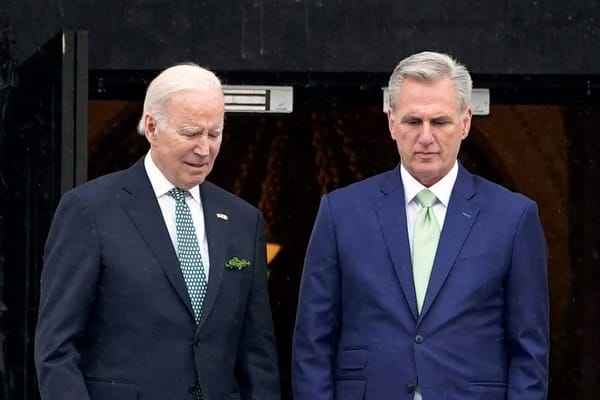The historian Jaques Barzun once quipped: “When people accept futility and the absurd as normal, the culture is decadent.” Those words come to mind when one considers the game of chicken being played in the US Congress over the debt ceiling. This political drama combines the absurd—lawmakers treating something potentially catastrophic as a political football—and the futile, in that everyone involved has already given up on ever fixing the deeper issues at stake.
Let us start with the absurd. For the past few weeks, Treasury Secretary Janet Yellen has been issuing increasingly frantic warnings that her department is running out of money and will soon be unable to pay Uncle Sam’s liabilities without the ability to borrow more. In 2011, the previous time drama around raising the debt ceiling triggered major turbulence, there were no serious international crises playing themselves out, nor any real moves from geopolitical rivals to ditch the dollar as a reserve currency. Back then, the idea of a multipolar world was just that: an idea, and not a widely shared one at that. This is no longer the case today.
In 2011, the truce reached by then-President Barack Obama and congressional Republicans was supposed to set the stage for a more comprehensive deal between the two parties on what budget items to cut. When this failed to happen, mandatory across-the-board cuts to the federal budget (so-called sequestration) came into effect, which among other things seriously undermined US military readiness.
The United States is a more politically polarized and economically fragile country in 2023 than it was in 2011, and the military is already facing a crisis of retention, recruitment, and sustainment, even as politicians are talking openly about the likelihood of an armed conflict with China. It is against this troubling backdrop that the political class has decided to put the full faith and credit of the US government on the line.
What gives this drama an air of futility is that no one seriously believes America will do what would be necessary to bring its ballooning deficit under control. The country is poised to enter into an arms race with China—a nation with a far larger population and industrial base—in order to prepare for a war almost 8,000 miles from US shores. Needless to say, this will require elevating military spending far above current levels.
On top of that, the (misnamed) Inflation Reduction Act commits the country to rebuilding its industrial base, reshoring chip manufacturing, and spending lavishly on green tech. At the same time, America is in the middle of a banking crisis that threatens to topple many of its regional banks, which in turn will need bailouts to avoid a systemic meltdown. Recession is also on the horizon, meaning tax receipts are set to decline, even as inflation ensures that government liabilities in the form of food stamps and other social benefits will go up.
Moreover, there isn’t all that much to cut in the federal budget: Around 60 percent of it is consumed by mandatory spending programs such as Social Security, Medicare, and Medicaid. To slash military spending—as occurred after the last debt-ceiling standoff—at a point when the military is already in crisis would be, in effect, to give up on most of Washington’s geopolitical ambitions in Asia and beyond. Reducing social spending as a recession looms isn’t a particularly viable option either. Kicking the can a bit farther down the road is thus the only practical option left—but debt-servicing is already eating up 7 percent of federal outlays, threatening to outpace military spending.
“The 2023 debt ceiling showdown is a symptom of a deeper malaise.”
The 2023 debt-ceiling showdown is a symptom of a deeper malaise. Expenditures are outpacing revenue at a rapidly accelerating clip, with no solution in sight. The American political class can’t agree on a way to raise revenues, nor can it countenance massive spending cuts.
The definition of a political crisis is the moment when it becomes impossible to continue doing what you have been doing, but it’s also impossible to do anything else. That moment hasn’t quite arrived for the United States, but it isn’t far away. In the play-acting over the debt ceiling, we see a political class fighting over cuts that won’t actually happen in order to fix a budget nobody believes can be fixed in the first place.
